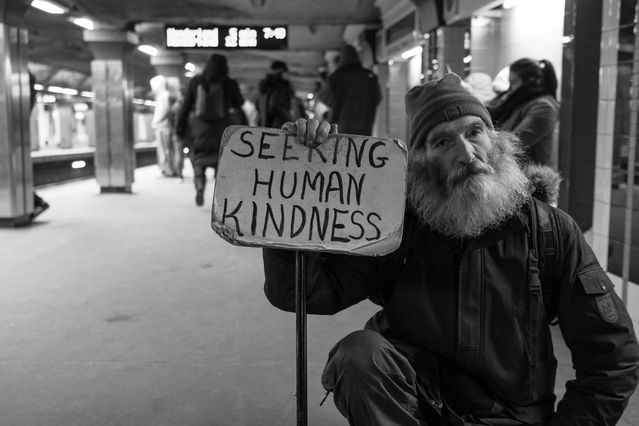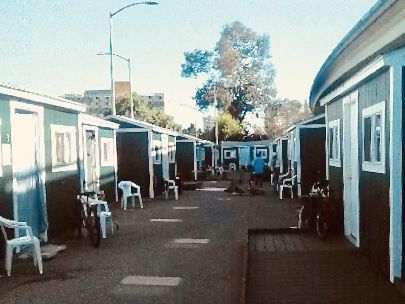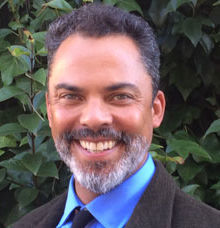Spirituality
Why Is It Hard to Be Kind to People in Great Need?
How to be a more helpful person in your daily life.
Posted September 22, 2018

We have both lived in the California Bay Area at different times of our lives. We have walked the streets across the years, having a variety of interactions with homeless people ranging from a steady gaze forward to sharing a sandwich and conversation. The “right” response was not always clear, but a familiar face on the corner of Durant and Telegraph Avenue each day was hard to ignore. Recently the community of homeless people has grown steadily, expanding to large rows of tents, carts, bicycles, dogs, and tarps along the side of a road or under a freeway underpass. In Berkeley, California, a tent city sprang up on the lawn of city hall last year. The increase is not unique to the Bay Area. It is hard to ignore the homeless people of all ages across the United States. And yet, for most of us, ignoring seems easier than attending to this rising tide of humanity in need.
Why do we avoid being kind to some people in some circumstances and find it easier in other situations with other people?
One landmark study on helping revealed a “bystander effect,” in which the more people observe persons in need, the less likely any one person is to act (Darley & Latané, 1968). There is a “diffusion of responsibility” so that no one person feels responsible for helping.
Homelessness feels like a “slow emergency.” Meta analyses of a large number of studies, which together included over 7,000 participants, concluded:
“The bystander effect was attenuated when situations were perceived as dangerous (compared with non-dangerous), perpetrators were present (compared with non-present), and the costs of intervention were physical (compared with non-physical)“ (Fischer et al., 2011, p.377).
Ironically, if we passed by a homeless tent on fire, and had an extinguisher in the car, we would be MORE likely to intervene. Since these attributes of immediate danger are usually not present when passing by a homeless person or homeless communities, it is not surprising many people are not helping and only rare individuals find the ability to make a difference in the face of this growing reality. But you can make a different choice.
Ways to ignite your kindness inclinations towards all people (and not throw some away):
-
Reframing helps. Sometimes, finding our way to kindness is a matter of reframing. As Americans, whether we are conscious of it or not, we inherit a tendency toward puritanical black and white moral frameworks. Those Puritan ancestors believed that who was saved and who was not was “preordained” and that social elites are chosen, and others...not. But the practice of kindness denies the notion that there are throw away people. In our wisdom traditions, Buddha starts the journey toward enlightenment when his compassion is aroused by encountering old age, sickness, and death. Rabbi Jesus proclaimed, “As you have done it to the least of these, my siblings, you have done it unto me.” The Hebrew prophets are unequivocal regarding our obligation to provide hospitality to the widow, the orphan, and the traveller. The ethic of being a host is legendary in many Muslim and other faith communities.
 Northgate Community Cabins in Oakland California, summer 2018.Source: Mica Estrada, used with permission
Northgate Community Cabins in Oakland California, summer 2018.Source: Mica Estrada, used with permission - Witnessing effective solutions helps. To overcome feeling low confidence we can make a difference, it helps to see effective action (Bandura, 1982). Recently, we visited under the BART tracks and the freeway in Oakland, CA. Here the moralizing condemnation those labelled as drug addicts, drug dealers, the houseless, sex workers, and the mentally ill has been discarded, and twenty neat green cabins have been supplied to house those who formerly lived on this patch of ground in improvised shelters, with no security or sanitation. Walking among the little green houses, it is easy to feel the transformative power of treating people with kindness and respect. This is not to romanticize the situation, for people continue to have their struggles. But we engaged in joking, horseshoes, and casual conversation with the residents about bicycle repair, Bible study, and what day the shower truck comes. There is community here and an example of an effective response.
 Horseshoe yard at Northgate Community Cabins, Oakland California, summer 2018.Source: Mica Estrada, used with permission.
Horseshoe yard at Northgate Community Cabins, Oakland California, summer 2018.Source: Mica Estrada, used with permission. - Acting helps. To avoid being a bystander or giving into the diffusion of responsibility, the only alternative is to act. There are plenty of opportunities to help even if you don’t have the time or energy to solve the whole problem. That’s okay. But be willing to ask yourself as you walk the city streets, “How do you want to be in relation to the unhoused?” and listen to the answer.


---------------------------------------------------------------------------------------

Co-Author, Carl Magruder, MA, MDiv, BCC, is the Director of Spiritual Support Services at ResolutionCare. Carl supports all systems of belief, from Atheist to Zoroastrian. His work recognizes that when physical health issues arise, spiritual well-being is a determinative aspect of our human existence and quality of life. He is trained as an interfaith chaplain with a Master’s of Divinity degree from Pacific School of Religion, and is board certified with the Spiritual Care Association.
References
Darley, J.M. & Latané, B. (1968). "Bystander intervention in emergencies: diffusion of responsibility". Journal of Personality and Social Psychology. 8 (4): 377–383. doi:10.1037/h0025589.
Fischer, P, Krueger, JI, Greitemeyer, T, Vogrincic, C, Kastenmüller, A., Frey, D; Heene, M, Wicher, M, Kainbacher, M. (2011). "The bystander-effect: a meta-analytic review on bystander intervention in dangerous and non-dangerous emergencies". Psychol Bull. 137: 517–37. doi:10.1037/a0023304. PMID 21534650.
Bandura, Albert (1982). "Self-efficacy mechanism in human agency". American Psychologist. 37 (2): 122–147. doi:10.1037/0003-066X.37.2.122


